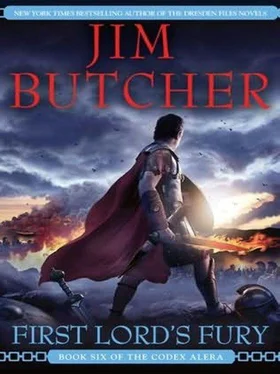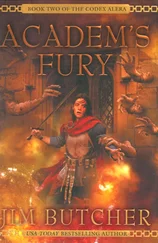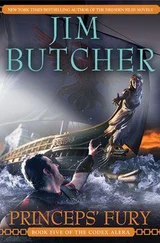Tavi frowned. “How so?”
Max gestured at the front of the ship. “Old Sextus never would have had his ship up front, where disaster could hit it if our fliers got sloppy or unlucky. He’d…” Max scrunched up his eyes thoughtfully. “He’d have positioned two or three of either his worst captains or his best up here. His worst to get rid of the deadweight if another ship went down, his best because they’d be the ones most likely to challenge his authority.”
Tavi grunted. “No good. I need all my captains. And Demos is the best captain in my fleet.”
“Don’t let Varg hear you say that,” Max said. “And speaking of taking pointless risks…”
Tavi rolled his eyes. “I had to. If the ritualists had been given time to whip the Canim into a frenzy over the two makers we killed, Varg wouldn’t have dared to leave them back at Antillus for fear he’d lose control. By changing the issue to a question of Varg’s personal honor, it brought the whole thing to a screaming halt. Varg is the dead makers’ champion now, not the ritualists. He’s still in control.”
“So when he kills you, it will be orderly,” Max said.
“It won’t come to an actual duel,” Tavi said confidently. “Neither one of us wants that. We’re only doing it to force the ritualists to hold back, rather than urging other Canim to take action and maybe remove Varg from power. But if Varg can pull the ritualists’ fangs, a duel won’t be necessary. We’ll resolve it before it comes to bloodshed.” After a hesitation, he added, “Probably.”
Max snorted. “What if he doesn’t? He brought the ritualists with him, you know.”
Tavi shrugged. “I doubt they all want me dead, Max. And they’ve got experience fighting the vord. He’d be a fool to leave them behind. He’ll handle them.”
“All right. But what if he doesn’t?”
Tavi stared out at the path ahead of them for a silent moment, and said, “Then… I’ll have to kill him. If I can.”
They hung on to the safety lines while the Slive bucked and shimmied over the ice. After a moment, Max put a hand on Tavi’s shoulder, then made his way carefully aft, to relay the heave-to command to Captain Demos.
For Amara, the next several hours were a desperate blur.
She came down square in the middle of the Crown Legion, whose legionares had been stationed at Alera Imperia for years, and many of whom would recognize her on sight. She nearly skewered herself on a spear, and the startled legionare she’d half landed on nearly gave her a killing stroke with his gladius . Only the swift intervention of the legionare beside him kept him from plunging the wickedly sharp steel into Amara’s throat.
After that, it was a matter of convincing the men that only their centurion could deal with her, and that centurion’s Tribune would need to do the same, and so on, all the way up to the captain of the Crown Legion.
Captain Miles was a more formal-looking version of his older brother, Araris Valerian. He had the same innocuous height, the same solid, leanly muscled build. His hair was a few shades lighter than Araris’s, but then both of them were showing enough threads of silver to make the distinction a fine one these days. Sir Miles limped over to her, moving briskly, every inch the model of a Legion captain, his face darkening with wrath. No surprise, that. Amara couldn’t imagine a captain worth his salt who would be thrilled to have some kind of administrative matter thrust into his hands now, when the battle was freshly under way.
Miles gave Amara one look, and his face went absolutely pale.
“Bloody crows,” he said. “How bad is it?”
“Very,” Amara said.
Miles gestured curtly for the legionares holding Amara’s arms to release her. “I wish I could say it was good to see you again, Countess, but you’ve been a harbinger for confusion and danger a little too often for my taste. How can I help you?”
“How can you get rid of me, you mean,” Amara said, grinning. “I need to see Aqui—Gaius Attis. Now. Sooner if possible.”
Miles’s eyes narrowed, then a small, hard grin touched his mouth. “This should be interesting. If you will follow me, Countess Calderon.”
“Thank you, Captain,” Amara said.
He paused, and said, “Countess. I take it that you aren’t going to attempt anything, ah, ill-advised.”
She smiled sweetly at him. “Would you care to take my weapons, Sir Miles?”
He huffed out an annoyed breath and shook his head. Then he beckoned for Amara to follow him.
She walked through the blazing light of Legion standards, passing from the Crown Legion proper into a space opened between the single surviving Imperian Legion and the First Legion of Aquitaine. The space between them was filled with cavalry, including, it would seem, the command group around Gaius Attis.
As Amara approached, half a dozen men with long dueling blades—Aquitaine’s singulares , presumably—drew their weapons and immediately nudged their horses to stand between Amara and Lord Aquitaine.
“Relax, boys,” growled Miles. He turned to Amara, and said, “Wait here, Countess. I’ll speak to him.”
Amara nodded stiffly, and Miles pressed through the singulares and disappeared. She did not look at the bodyguards and stood with her weight far back on her heels, her hands in plain view. The very gentle slope of the land let her look down over the heads of the legionares between herself and the actual battle line, and she paused for a moment to watch the battle.
From far enough away, she thought, it looked nothing like a brutal struggle. The legionares looked like laborers in a field, all spread out in a line, their weapons rising and falling while trumpets blew and drums pounded. The shouts of battle blended into a single vast roaring noise, like wind or surf, individual cries swallowed up and made insignificant against the aggregate sound.
Amara murmured to Cirrus for a farseeing, then swept her gaze up and down the lines.
Last year, almost all of the enemy infantry had appeared as low-slung, swift-moving imitations of the vicious lizards of the Kalaran swamps called “garim.” Most of the rest had looked almost like nightmarish renditions of armored Alerans, their arms transformed into stabbing, chopping scythes, while great wings like those of beetles or perhaps dragonflies lifted them into aerial combat.
The vord had taken new forms.
Most of them, Amara saw, looked like some kind of enormous praying mantis, though squatter, more powerful-looking. They rushed across the ground on four legs, while the two lengthy forelimbs ended in more curving scythe blades. The reason for the change became apparent within seconds, when Amara saw one of those huge scythe-claws flash up, then down, at the end of the vord’s unnaturally long limb. Its point swept over the shieldwall of legionares of the Crown Legion, and plunged down with inhuman power, slamming through the top and rear of a luckless legionare’s helmet, slaying him instantly.
The vord did not stop there. The creature dragged the legionare’s body forth from the line, swinging it left and right as it did so, battering the legionares on either side of the dead man. Other vord rushed toward the disruption in the lines, and more men died as the creatures stabbed down with their blades, or hooked a legionare’s shield with them, to drag another man out of the defensive advantage of the line.
The vord had developed new tactics along with their new forms, it would seem.
But then, so had Aquitaine.
Within seconds of the vord assault, a pair of men stepped out of the rear ranks wielding great mauls of preposterous size—Knights Terra. Drawing their power from the earth beneath them, they stepped forward with the heavy weaponry, shattering chitin and slaying vord with every swing. Within seconds, they had killed or driven back the vord nearby, after which they returned to their original positions. As they did, a centurion, bellowing until his face was purple, kicked his men into a semblance of order and re-formed the line.
Читать дальше











